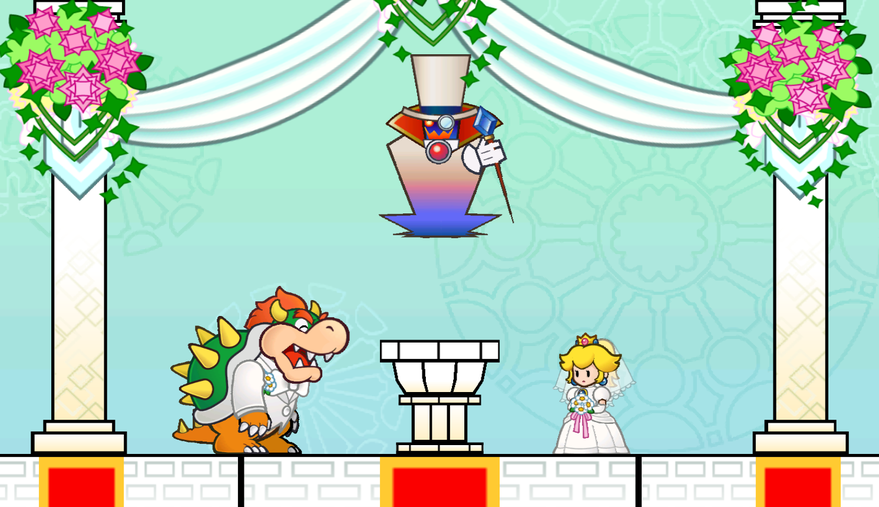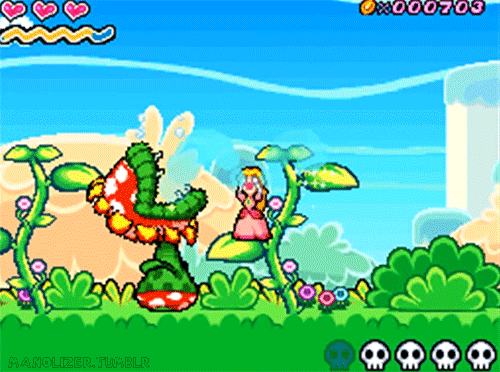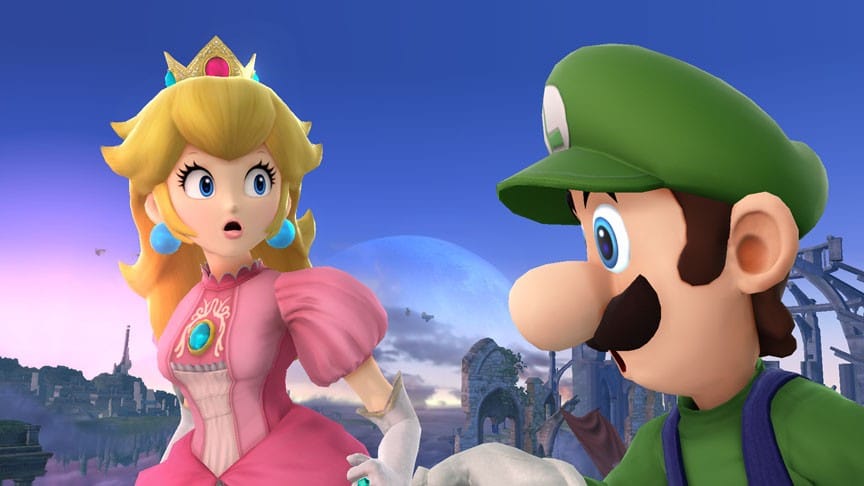Forget Mario. Let’s talk about Peach.

This article is part of Mario Week, our seven day-long celebration of the 25th anniversary of Super Mario World and 30th anniversary of Super Mario Bros. To read more articles from Mario Week, go here.
///
She is the damsel in distress, constantly kidnapped and saved by men. She’s the parasol-wielding badass. She encapsulates everything wrong with the way women are represented in games. She encapsulates everything right about how that representation is improving. She is the epitome of weakness, with next to no narrative power of her own. She is the epitome of strength, a monarch who rules her kingdom fairly and loyally. She is the worst female videogame character ever; she is the best female videogame character ever.
Peach, the picture of politeness, regality, and cognitive dissonance
I’m going to be frank here: Mario does not interest me whatsoever. His wants, desires, and motivations have been explored for decades now, and they all amount to just about the same thing: save the girl, become a hero. Meanwhile, scuttled to the sidelines is his human prize, a brew of psychological intrigue: Peach, the picture of politeness, regality, and cognitive dissonance.
From this vantage point, Peach is the most psychologically complex character in the entire Mario universe. In the one game she has ever been allowed to star as the main protagonist (Super Princess Peach), her emotions are literally the main gameplay mechanic. She controls her feelings of joy, sadness, and anger to vanquish her foes. Meanwhile, Mario jumps on them. Peach floats on a parasol and shoots people with mushrooms she magically produces from the ground. Mario punches, then jumps on them.

It isn’t hard to understand why most of Peach’s interactions with the portly man she’s supposed to desire are characterized by a distinct frigidity. In 1998’s Super Mario Bros. 3, Peach actually congratulates her savior by saying, “Thank you Mario but our Princess is in another castle! Just kidding! Ha Ha Ha! Bye Bye!” That’s a text message breakup if I’ve ever seen one. In later games, Peach is made to warm up to Mario (getting a better English translator helped with the lackluster tone of many other characters, too). But even so, Peach appears to allow herself to be Mario’s prize out of a sense of duty rather than affection. You can read it plainly on her face during the ending cutscene of Super Mario 64. Her mouth says she’ll reward Mario with “cake” (whatever the fuck that means). Her blank gaze says, “Close your eyes and think of the Mushroom Kingdom.”
On the topic of cake, Peach seems to offer other characters in the Mario universe a lot more than just baked goods for doing far less than saving her. In fact, she may potentially have produced a half reptile/half human monster baby with her eternal captor, by the looks of her nonplussed reaction to Bowser Jr. calling her “mama Peach” in Super Mario Sunshine. Sure, Bowser claims she actually isn’t his mother when all is said and done. But if it was an absolute impossibility (i.e if Peach had never copulated with a reptilian monster turtle), you’d think she would have denied Bowser Jr’s claims a little more vigorously. Or, like, at all. And that’s not to mention the pretty strong evidence in Super Mario Galaxy that supports the possibility of Rosalina being Peach and Luigi’s love child. I mean, yeesh, Peach even shows more concern for her stolen vibrator (the “mysterious” “vibe” “scepter”) than for Mario’s kidnapping in Super Princess Peach, seemingly suffering from the Nintendo equivalent of female hysteria.
Close your eyes and think of the Mushroom Kingdom
But here’s why most players hardly give Peach’s perspective any thought—let alone consider the implications of her sordid love affairs. Despite the fact that Peach progressed over the decades to become one of the more fascinating and fan favorite characters, the foundation and emotional center of the player’s experience in a Super Mario game relies on Jumpman as the player’s vessel and the promise of a heroic prize at the finish line. Nintendo fundamentally believes that Peach is defined less by her personality, and more by her appearance and object-ness. When asked why she wouldn’t be a playable character in Super Mario Bros. Wii (instead replaced by a second Toad), Shigeru Miyamoto blamed it on Peach’s skirt requiring different programming. So let’s just imagine the scene that lead to this decision:
Programmer: So, Peach’s skirt will require special programming.
Miyamoto: Then cut the bitch. Miniature toad people are more similar to Mario than a human like Peach, right?
Guy at the back: Or, you know, we could just put her in pants and give people a new version of their fan favorite character.
Miyamoto: You’re fired.

When Miyamoto addressed the issue of Peach perpetually serving as the damsel in distress in a Kotaku interview, he essentially blamed it on the nature of the platformer genre itself:
“For me in particular, the structure of the gameplay always comes before the story. And so we’re always looking at, when we’re putting that together, what is the most natural story to take place within that structure. Pikmin is a good example of that. In Pikmin, the original structure of the gameplay was centered on all these individual little creatures moving around like ants. As a result of that, the world that you’re in is kind of earthy and natural settings and the creatures you’re fighting seems sort of like insects, because that’s what the gameplay centers on. So, if we end up creating a gameplay structure where it makes sense for, whether it’s a female to go rescue a male or a gay man to rescue a lesbian woman or a lesbian woman to rescue a gay man, we might take that approach. For us it’s less about the story and more about the structure of the gameplay and what makes sense to be presenting to the consumer.”

Apparently, the designers would have to invent a whole new type of game in order to justify gameplay that depicts a female saving a male (or whatever). Mario’s heroism and Peach’s objectism isn’t just fundamental to the Super Mario Bros. universe. According to Miyamoto, Nintendo’s strict adherence to traditional gender roles somehow transforms a platformer in which you fight turtles and attain super powers by eating mushrooms into a more plausible, digestible world for the consumer.
Yet, even though Peach is pretty much doomed to be relegated to the (somewhat unwilling) object of the player’s affection, she managed to mean much more to me as a little girl. As a little girl, I dressed up as a princess for four consecutive Halloweens. When I grew up, I decided it was time to mature, so I dressed up as a dragon queen for three consecutive Halloweens instead. I flatly refuse to engage in any Mario-related activity unless I am allowed to play as the character who managed to transform the conventions of femininity, which I always felt so compelled to abide by—high heels, make up, jewelry, grace—into an empowering experience. In 2015, I’m still waiting for Nintendo to see the true value of their Toadstool princess.
Until then, I’ll settle on imagining her secret repulsion for the mustachioed plumber who insists on eating her cake and interrupting her BDSM roleplaying sexcapades with Bowser.
///
This article is part of Mario Week, our seven day-long celebration of the 25th anniversary of Super Mario World and 30th anniversary of Super Mario Bros. To read more articles from Mario Week, go here.



